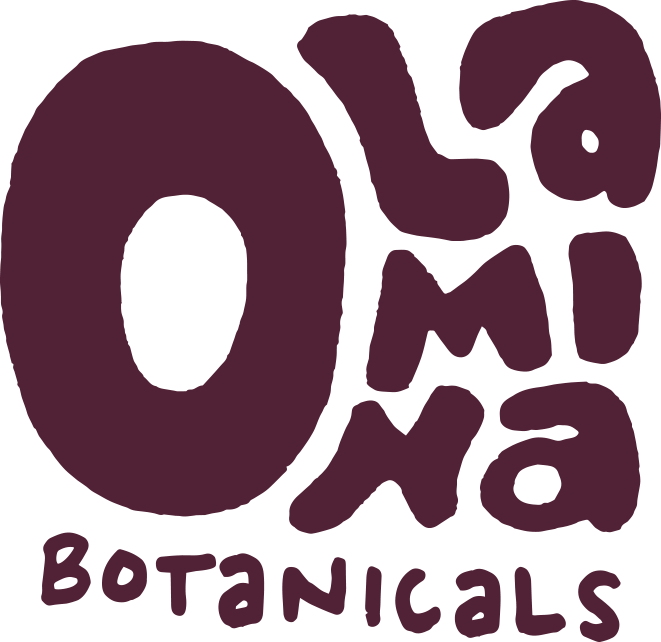Hello World 🤎
Hi there! Welcome to Olamina Botanicals, home of my apothecary and community herbalism project. This blog is a home, too: for my musings on healing, ecology, labor and liberation. With my new website launching, I wanted to share a bit about who I am and why I do what I do.
I am a Black femme herbalist, gardener, grower and educator. I love connecting with and sharing the benefits of the wild foods and wild medicines growing in the corner of Lenapehoking (New York City) that I call home. Through this project I offer herbal formulas, herbal consultations, workshops and plant walks. My offerings are in service of helping folks connect with the Earth, the source of all life.
The cracks are where the light gets in. I came to plant medicine after a decade as a student activist and organizer experiencing various hallmarks of burnout: fatigue, acute anxiety and fainting spells from exhaustion and overwork. After a make-or-break year of campaigning, I made a dramatic exit from a path that seemed to offer little space for my own liberation and moved to farm country. My first paid agriculture job was on a 4-acre organic fruit and vegetable farm where I was caretaker of the farm’s edible flowers and medicinal plants (Tulsi, Lemon Balm, Gotu Kola, Passiflora and Andrographis among them).
I had left my full-time organizing work sure that whatever I needed to find was out there—that it lay on the other side of my fear. Soon, I discovered that consciously strengthening my connection to the plant world was helping me begin to heal deeply, inhabit my body and address harm built-up from years of navigating in mostly white, male-dominated, hierarchical organizations. I’d met and known herbalists previously and been in awe of their work. Now I understood a bit of the magic they carried. I felt that my path was clear.
Working with plants felt like a return however, rather than a wholly new discovery. I grew up between the Potomac and Patuxent Rivers, enchanted by the beauty of the Chesapeake Bay and its tributaries from as early as I can remember. My most vivid memories from childhood were of wandering in the woods, collecting and nibbling flora of interest. I would follow streams, keep my eye out for known edible plants and pretend my home was the woods, as if I was the protagonist in a Jean Craighead George novel. I also gardened with my grandmothers. Summer afternoons were spent with my mom, driving up and down the highway outside our neighborhood, picking out the freshest ears of corn and ripest tomatoes from elderly farmers at their roadside farm stands. From early on, I knew that food was a kind of medicine, too. Being with the Earth was a way of cultivating connection with those I loved.
I am descended from Africans enslaved in the United States. My ancestors were kidnapped from their land, brought to Turtle Island, terrorized post-Emancipation and, during the Great Migration, forced to flee the rural South in search of safety. In search of opportunity. For several generations following this rupture, no one in my ancestral line made a living off of the land. In returning my attention to the earth as a grown person, with plants and the land I re-discovered a realm of magic, immense beauty, mutualism and peace. With Black people today surveilled, exploited, red-lined, criminalized and shut-out from not only economic opportunity but also opportunities to connect with that which sustains life, yet still able to find joy, I discovered that, as I walked the path of the plant healer, I could exalt in the privilege of having arrived at a place where I could be of service. To be of use became a way of lightening my load and lighting a path for others.
I have studied herbal medicine at the Terra Sylva School of Botanical Medicine, taken classes at ArborVitae School of Traditional Herbalism and apprenticed with the following herbalists and folk healers: Tane Datta of Honaunau, Hawai'i; Ben Schwartz of Webatuck, New York; Adam Flores of Vieques, Puerto Rico; and Janet Kent and Dave Meesters of Marshall, North Carolina. I continue to pursue study in topics such as anatomy and physiology, phytochemistry, field botany, mycology and nutrition. Relevant courses include Tammi Sweet’s Materia Medica Cannabis, Mimi Hernandez’s Understanding Medicinal Plant Constituents and Sade Musa’s Sankofa: Reclaiming Healing Traditions of the African Diaspora. Herbalism is a lifelong, non-linear practice and study. I am fortunate to walk this path, and view each encounter that I have with a plant—both familiar and new—as an opportunity to deepen my practice.
Learning to be in community with non-human nature continues to expand my consciousness, fortifying me in the ongoing struggle to dismantle what bell hooks calls the "imperialist white supremacist capitalist patriarchy." The United States is the only industrialized country in the world that does not provide its citizens access to universal healthcare. In a system where white skin, citizenship, money, ability, heterosexuality, masculinity and hierarchy define who receives the best care, I offer my work as an accessible option for both those who have slipped through the cracks, and those who seek a deeper connection to their bodies and the Earth.
The politics that I formed during my days of organizing for social change still very much guide me. Popular education, social ecology, poor people’s movements, the food sovereignty and Black liberation movements are my deepest influences. With Olamina Botanicals, I hope to weave the joy that I have received from being with plants with the directive I received from my ancestors to remake the world.
Thank you for journeying with me.

